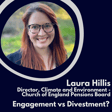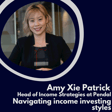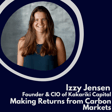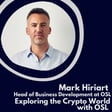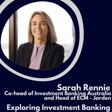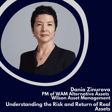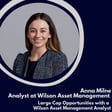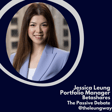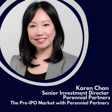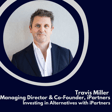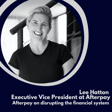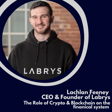Podcast Introduction by Emily and Clooney
00:00:03
Speaker
Welcome back to the Alpha Females Invest Podcast, two females working in the finance industry searching for alpha. My name's Emily. And my name is Clooney. And together we bring diversified perspectives from the buy and sell side of the finance world. We provide listeners with a deep dive into financial topics by interviewing experts in the field.
00:00:23
Speaker
As we both work in finance, we can get into the nitty gritty and ask the technical questions on topical financial issues. We also really seek to elevate female voices in the finance industry to provide our listeners with diversified perspectives. As usual, of course, any information discussed in this podcast is not financial advice. All opinions do reflect those of the individual, and you should always read the PDS and talk to a financial advisor who can consider your personal circumstances before you invest.
Guest Introduction: Sarah King from Stockspot
00:00:52
Speaker
Today, we'll be chatting with Sarah King, who is the Head of Advice and Client Care at Stockspot. Stockspot is a platform for online investment advice, which is also sometimes referred to as robo-advice, and it provides its customers with a custom portfolio of ETFs all wrapped up in a all-in-one solution which makes financial advice accessible to everyone.
00:01:12
Speaker
I love what FinTechs have enabled for the finance industry and particularly any type of FinTech that promotes financial inclusion and literacy, which is why I'm really excited to have Sarah on the show today. Welcome, Sarah. Thank you so much for having me on the show. I'm very excited to be joining you today.
00:01:28
Speaker
So today we've called out episode the financial advice trailer as I think there are sort of three elements to unbundle here. Firstly our listeners are typical professionals perhaps in the financial industry who have a pretty solid amount of financial literacy so do we need advice or should we be managing our own money directly. I think second to that if we do need advice what is the best way to go about it.
00:01:52
Speaker
know, should we be going to a traditional financial advisor or is robo advice like stock spot going to be more appropriate? And then finally, I think, you know, should we be looking at passive or active investing strategies? So a lot to unbundle in this episode, and I'm really excited to jump in. But before we do, Sarah, it's time for my favourite question of the episode.
Career Anecdote: Embarrassing Moment at London Investment Bank
00:02:14
Speaker
So to give you a little bit of background, we obviously have a lot of high flyers on the show like yourself. So to break down those barriers of professionalism with our listeners, we just like to ask each guest what has been their most embarrassing career moment. So if you can, we'd love to hear one from you.
00:02:32
Speaker
Yes, this is a difficult question to think through. So yeah, I think it really takes me back to my London days when I was actually working for one of the big investment banks over there in more of an administration role at the time. And I worked for this quite crazy investment banker. And I remember one day going into his office looking at his receipts and these lavish expenses that he'd incurred of a weekend. And I walked into his glass windowed office and I was like, Terry, like,
00:03:00
Speaker
How have you spent thousands of dollars on this champagne and this dinner? How am I going to get this expense report across the line for you? And he literally lost it at me. He flipped his lid. He couldn't see all of it. And it was so embarrassing. The whole floor looked up at me. And if anyone who knows me personally, I went bright red. And my heart just sank. And I had all these BDI's looking up at me. And it was so embarrassing. It was a bit humiliating and a little bit unnecessary. And I think that was just
00:03:29
Speaker
Yeah, a moment that really sprung to mind when I thought of maximum embarrassment. I often think about him and hope that he got his payback. I wonder if his expenses ever went through. That's it. Yeah, probably wouldn't fly now, that's the thing.
00:03:49
Speaker
No, that's really interesting and obviously that type of behavior is just not fun to anyone involved. So I'm really sorry you had to go through that.
Understanding Robo-Advice: Stockspot's Role
00:03:59
Speaker
So could you start with just introducing StockSpot to our listeners and its purpose? Absolutely. So as you mentioned earlier in the intro, so StockSpot is an online investment advisor or as we call it now an automated investment advisor. So what we help our clients do is access low cost
00:04:17
Speaker
diversified portfolios that include exchange traded funds. And they're really linked to, you know, your goals, your risk appetite and your investment timeframe. So within that, we make sure that you get, you know, the right mix of investments, the right strategy, top quality ETF for a mix of different ETF providers. And then we manage things like, you know, automatic dividend reinvestment, portfolio rebalancing, making tax time easy. So really, we just want to make that whole end to end process simple, easy and efficient for our clients.
Why Finance Pros Need Financial Advice?
00:04:48
Speaker
And so I guess going back to one of my first questions, Sarah, why do individuals in your opinion need financial advice, you know, particularly financial professionals who have a pretty good understanding of investing? Yeah, it's a good question. And the main reason people see that they have a need for advice is that there's some kind of goal or objective that they want to achieve. And it might be something like, you know, I'm saving for a home or, you know, I want to be able to fund my kids education in the future. Or I just want to know that I'm going to be comfortable in retirement.
00:05:17
Speaker
And it's usually those types of things that will drive someone to go and actually seek out getting investment advice or holistic financial advice. And so what that can look like is, you know, you might go and see a financial planner and they're going to sit down with you and say, okay, like, what are your goals? What are your objectives? Where do you want to be in five years time, 10 years time? And they can be quite difficult questions for anyone to sort of put their mind through and work out. A good financial advisor is going to ask you, you know, what's your cash flow situation?
00:05:46
Speaker
What are your budgeting needs? What insurances do you need? What plan do we need in place for sort of accumulating wealth over the years so that you can rate your short, medium and long-term goals? What about your retirement? What does that look like? How can we make sure we're maximising that? And then at the end of that, there can also be those estate planning needs. So, you know, do you want to leave a legacy? Do you want to leave inheritances for your children? So quite a broad skill set and a lot of things that even, you know, going back to investment professionals,
00:06:15
Speaker
a lot of the things we don't know that stuff. And so that's where a financial advisor can be really beneficial in helping you work that out and actually map that out. And from what I know of a lot of finance professionals, they might be time poor, or they might have a specific area of knowledge that isn't necessarily about how to, you know, invest their money, how to take less risk and how to reach those goals. And good advice is really going to help you map that out and keep you accountable and on track to reach that long term.
00:06:42
Speaker
That's such a good summary. As you were asking those questions, I was like, cashflow, what does my cashflow look like? Not good. Great. Em, don't worry. I was writing down a list of everything he has mentioned. I'm going to go back and pick those goals. Good.
00:06:58
Speaker
Managing money for someone else is one thing, which is something that I do, but managing it for yourself is a completely different story where you've actually got to think about your own life decisions and your own goals. I completely can resonate with the need for a financial advisor, even if we do have a specific niche into investing that we do every day. You really need that holistic approach.
00:07:21
Speaker
I guess then if we're a finance professional, we decide that financial advice is probably the safest and smartest thing to do for us.
Choosing Between Traditional vs. Robo-Advisors
00:07:29
Speaker
How do we go about choosing an advisor? Do we go the traditional route and have someone who's more of a face-to-face type role, or can we go to more of that automated advice style of robo-advice? How can we make that decision to choose between the two?
00:07:44
Speaker
Yeah, so that's a good question. And I think the decision between the two really comes down to, like, how complex are your circumstances? What do you really need? And really, for the majority of us, a lot of us don't need that holistic end-to-end financial planning. We might just have some money in a savings account or a term deposit. We know we should be doing something more with it. We've got these goals that we want to work towards. And that's where robo advice is really good, because it's absolutely tailored to that.
00:08:11
Speaker
you'll be matched to a strategy that's going to help you achieve those goals. So, for example, we have a lot of clients saving for a home deposit, so we can ensure they're in a strategy where they're taking less risk, their investment time frame shorter,
00:08:23
Speaker
and they're not going to fall short of those goals and objectives. Compared to someone, if you're choosing, say, your more traditional face-to-face finance advisor, the important things that jump out to me, first and foremost, is independence. You really want to choose an advisor who is independent from the products they recommend. That's just my experience. And I speak to a lot of people who go to one of the big four, for example, and they've only got $50,000 and they've just been recommended
00:08:53
Speaker
insurance products or you know products are affiliated with that big institution and that's really not necessarily in the client's best interest. I think avoiding those conflicts of interest is really important so that's the first one for me making sure that they're independent. I think also you want to work with someone that you have a good relationship with and that you can trust. There's transparency there and I think you know often you can go to an advisor and you'll have that initial meeting if they're not taking the time to actually
00:09:20
Speaker
sit down and understand you as a client, getting to know you, your objectives, you know, your goals, what do you want to achieve? That would be a bit of a red flag for me. So yeah, so really, whether you go full fledged advisor versus robo, complexity is your need. If you are going for that traditional route, then obviously you want to work with someone you trust. But that also goes with robo advice as well. You know, I get a lot of questions around, should I trust soft spot? How can I trust you with my money?
00:09:47
Speaker
That's what we also provide, even though we're a robo-advisor, we're super accessible and our clients can contact us and get advice on anything related to investment portfolios. So yeah, so I hope that gives you a few points to consider.
00:10:00
Speaker
I think that point around independence, Sarah, of the financial advisor is just critical because I do feel there is a real trust issue around personal finances. I think you really do want to work with someone you can trust. I think it's critical to know that their interests are aligned with yours and not necessarily a third party's.
Stockspot's Income Model and Investment Advice
00:10:19
Speaker
Turning to Stockspot more specifically, what is Stockspot's business model and how do you generate income from that?
00:10:27
Speaker
Yeah, so we are a robo advisor, as you know, so we provide scaled advice. So that is advice that we can, you know, offer to as many Australians as we want to. And we're specifically limited to providing advice on investing. So as I said, we help our clients access diversified ETF portfolios.
00:10:47
Speaker
And the way that we generate our income is from the fees that our clients pay. Our clients basically pay an all-inclusive fee that's based on their account balance. And they fall into different fee tiers. They're all-inclusive, there's no conflicts of interest, kickbacks, commissions. So obviously the more clients we have, that means we get more fees. But really, yeah, it's just that our model is just providing that limited bias focused on investing.
00:11:14
Speaker
Yeah, that makes sense. I guess one of the other things that we tend to get questions on is the visibility of entry and exit prices when we're not trading directly through a security. So how does StockSpot provide that visibility that you might trade on one day, but you might not know what price you're getting for your securities?
00:11:33
Speaker
Yeah. So all of our clients have an investment dashboard that updates daily with their account information. We also have a mobile app that does the same. So that's the beauty of things like ETFs and, you know, the robo advice model. We can make sure that our clients get that personalization and full transparency and visibility in their dashboard. So when our clients log in, for example, they can see what their account balance is. They can track their total return.
00:11:58
Speaker
There's a performance section that breaks down all of the ETFs they own, the individual purchase dates and the purchase price, along with their income return, their capital return. So there's that full visibility, which we think is super important. And that's also the beauty of ETFs because as you know, they trade at their net asset value and their market price daily. So yeah, our clients, I think that gives them trust and confidence in our product because you've got that immediate transparency there.
00:12:27
Speaker
So, Sarah, if I wanted to invest in StockSpot, what is the minimum needed? And I guess potentially, if you do have a maximum value, what is that too? Come on, Clooney. Come on, guys. I might be the maximum. Never know. Just kidding. What is the average balance of your users on StockSpot?
Minimum Investment Strategy at Stockspot
00:12:48
Speaker
Yeah, so you can start investing with just $2,000. And with that amount, you'll get one sort of growth-focused ETF and one defensive. So you've got that nicely diversified portfolio from the get-go. If you're wanting to have all five asset classes, which we have in the portfolio, that happens around about $8,000 to $10,000. Yeah, so even if you don't have $2,000, you can deposit money into your cash account and build your way up to that.
00:13:12
Speaker
Similarly, our clients can top up with any amount along the way. So yeah, $2,000 to get started, but then there's no cap. We work with a lot of different clients from your first time is just getting started, your professionals who are seriously accruing like a larger amount of savings.
00:13:27
Speaker
up to, you know, self-managed super funds that have multiple, multiple millions of dollars and individuals and trust. So it's quite a wide spectrum. I would say that average account balance is around about that 40 to 50K. So really that sort of young professional cohort who have, you know, really starting to generate a lot of savings and are wanting to make their money work harder for them. Well, that's great to hear. There's no max. That's clearly really relevant for the end of myself.
00:13:57
Speaker
A low on question, if you do start with $2,000 and you want to increase that, you've got another three grand to put in, you want to increase that to five, at what point do you encourage investors to pick up a third or fourth or fifth asset class? Or is it just a jump from two to five? Yeah. Actually, our tech and automation manage all of that for our clients. We phase in the ETF so that we're managing the amount of risk our clients are taking for those smaller portfolios.
00:14:23
Speaker
you know, we start with Australian shares and bonds to start with, so that mix of growth and defensive. Then in our portfolio, we also have gold as an asset class, and that's your defensive insurance policy within the portfolio that's going to give you that downside protection if there's share market volatility. And then closer to that sort of 8, 10K mark, we introduce our global shares. So that's put out into emerging markets and your global developed market. So that's all managed by the smart algorithms that we use. All our clients really need to do is
00:14:53
Speaker
top up, they can top up with any amount and then we'll manage that phase in process for them. Then once they're fully diversified and if they continue to top up, our job is to keep their portfolio nicely aligned to those target weightings for their strategy. So if they're conservative, we want to keep them to the 60 defensive 40 growth split compared to someone who might be in the high growth, you know, 78% growth to a 22% split. So we're carefully ensuring that our clients are nicely balanced to help manage risk.
00:15:23
Speaker
and to help them achieve those consistent returns objectives year after year. I need some of those optimised algorithms for my own investment. So I guess one of the things that investors get scared about is, of course, during a downturn, the ability to withdraw their cash. In the pandemic, lots of people took out their money because they're worried about the stock market crashing 30%. Then it went up 30% to 40%.
00:15:49
Speaker
I guess do you hold a proportion of cash for your clients and is there any restrictions on redemptions or can clients draw down their money when they need to? I'll talk to the accessibility piece first. All of our clients own their investments in their own name under your unique hints. That's a good thing because it means that they're the legal and beneficial owner of those investments at any point in time.
00:16:11
Speaker
clients can log into their dashboard and lodge a withdrawal anytime they want to. So although we have recommended time frames for the portfolios, they could really log in and lodge a withdrawal and we'll go to market or the next business day and those investments will be sold down and the funds transferred to their link to count four to five business days later. So there's
00:16:30
Speaker
no issue with accessibility, which there can be with other types of investments like managed funds and other things like that where they can freeze redemptions if the market goes south or there's other sorts of issues that emerge. So that's the beauty of ETFs again and owning investments in your own name. It gives you full access and control at all times. So that's one thing our clients like about that as well is knowing that they have that accessibility piece. It's a really, really important consideration.
00:16:58
Speaker
Now, when it comes to a big market drop and, you know, do we keep money in cash? No, we don't. And actually, we know that when there is a market drop, the worst thing you can do is move to cash or increase your allocation to cash because it usually means that you can be locking in losses by selling out of asset classes that have fallen in value. Our advice to clients if there is a market tip is to stick with your strategy. And that's why we make sure that our portfolios are diversified across different asset classes.
00:17:26
Speaker
that have different correlations with one another. So if we look back to March 2020, when the share market fell by, gosh, 35% or more here in Australia,
00:17:35
Speaker
our clients were cushioned significantly, and their portfolios fell by about 50% to 80% less than the share market because they had those defensive investments, like bonds and gold. It's really important to have your growth focus investments, but also those cushioning investments that will protect your portfolio when there's share market volatility. For our advice to clients during market volatility, or if there's
00:17:58
Speaker
a lot of hype and noise in the media is to stick with your strategy, block out the noise, and we make sure that they've got as much money invested in the market. That's actually a really good time to usually top up your portfolio to take advantage of cheaper prices in those asset classes that might be underperforming at that point in time.
00:18:16
Speaker
So following on from that, Sarah, there are obviously huge benefits, as you just mentioned, to maintaining your investment portfolio and an argument to even add to it during downturns. Is there a specific timeframe that you encourage investors to invest for or does it vary amongst your client base?
00:18:33
Speaker
Yeah so I mean the golden rule we've been investing as you all know is time in the market so obviously the longer the better but yes we do have set sort of recommended guidelines for each of those strategies so for our conservative portfolio we say a minimum of three years
00:18:50
Speaker
Typically, we'll see clients going into strategy who are more risk-averse, capital preservation is important to them, or their investment time horizon might be a little bit shorter, and these can be clients who are saving for a home deposit, for example, who might want to access that money in three years or four years and take less risk.
Investment Timeframes for Optimal Returns
00:19:06
Speaker
Compared to our more growth-focused portfolios, we'll usually say a minimum of five years because you want to be, obviously, have time in the market
00:19:14
Speaker
and your distributions, be reinvesting those, enjoy the compounding of returns. But equally, if there is a bit of a dip, you've got time for it to recover on the other side. So of course, you can access your portfolio any time or your funds any time rather. But yeah, really, the longer the better. So I'll always set a client minimum of five years, ideally 10, 15 or more if you can.
00:19:35
Speaker
So that's where we'll often see clients actually setting up two different portfolios with different strategies. And that's where they've got quite specific goals for those portfolios. They might want to have a pool of money that they need to draw on in the more medium term. And then they've got their long term that they know they're not touching for years and prepared to take a bit more risk with that. So that's when we see that gold based investing really working with this robot bias model as well.
00:19:58
Speaker
Yeah, that makes complete sense. It's great that you can have multiple portfolios for different scenarios, which is fantastic. I wanted to dive in a little bit to the active versus passive debate. Of course, your focus is on low-cost passive ETFs to provide really diversified exposure, which is a great way for clients to access that broad
00:20:20
Speaker
investing market. I guess particularly in volatile markets, active management does have a position in a portfolio potentially because professional managers are able to pivot or rotate the portfolio depending on market conditions. Of course, I would say that given it's my job. But I guess I wanted to understand your thoughts on why you're focused on passive and if there is an aptitude for active going forward or in future.
00:20:50
Speaker
Yes, we're definitely focused on the passive side. It's very much that buy, hold, rebalance along the way philosophy. From what we know with investing, the more that you're buying and selling within a portfolio, incurring transaction costs, crystallizing tax
00:21:07
Speaker
That has a bit of a drag on investors' returns at the end of the day. Our philosophy is really built around the less you do, the better you're going to be. Now, if you look at active fund managers from the research that we reference, in particular, the fever report, there might be an active fund manager that does well in a certain year, but then if you look at the statistics that show
00:21:29
Speaker
you know, only about 20% of active fund managers outperform their set benchmark over three to 10 years. And if you project that out for 15 years, it's only 15%. And of those active fund managers that actually do do well, it's only about 1% that managed to stay in that top quartile. So unfortunately, when we speak to clients and what we see is they're paying higher costs to access those active funds
00:21:54
Speaker
They're not getting the consistent returns that they need year after year. They might in one year, but they might fail to do so in subsequent years. So in our view, it's just better to buy the market, have exposure to the whole index, all the Aussie shares.
00:22:07
Speaker
every year, you're going to have exposure to the shares that do well. You don't have to look for that needle in the haystack, you just buy the haystack. Now, what we do see from time to time is, yes, some clients want to tailor their portfolio, have that little bit of customization, and that could be, yeah, it could be putting a bit of money in an active fund, and that's maybe more your core satellite approach. So my advice to clients would be, have the majority of your funds in your sensible, well-diversified portfolio, then if you want to have that
00:22:34
Speaker
bit of an add-on on the side, do that with a smaller amount of your money. And that's why we've introduced things like soft spot themes to our product offerings for clients. So it gives our clients the ability to access different sectors, themes, geographies, just to tailor their portfolio a bit. Maybe you get a bit more niche on a certain theme like tech or healthcare or something that's underrepresented here in Australia, but we kind of cap it. So it's not going to be a return drag on their portfolio, but more of a boost hopefully over the long term.
00:23:02
Speaker
So, yeah, that's really our view on the Asi-versa-Asi debate. I think it's always a good one to chat about, and it always frees up a mix of opinions. If we had more time, Sarah, I'd get Em to jump in on the active side of things, but I think to save our listeners, we'll keep the conversation moving.
00:23:19
Speaker
Obviously, this sounds like there are a lot of benefits to passive investing, and specifically, robo-advice, some of which you just mentioned and I think are really key. Can you talk to us about what are the key disadvantages, if there are any? Yeah, I guess the main disadvantage, if you'd call it a disadvantage, is that it's limited advice. If you are wanting to get
00:23:40
Speaker
more comprehensive advice or advice on, say, tax and a little bit on super, you're not necessarily going to get that with a robo-advisor because it's limited to investment advice. So a lot of the time, clients will call me up and they're like, can you give me advice on tax? I'm like, I'm really sorry I can't. You might need to go and speak to a tax professional about that. But that works really well. They can work in conjunction with each other. The only other thing would be if you are looking for that
00:24:05
Speaker
face-to-face relationship where you want to go and meet your advisor, sit down, have a cup of coffee, have a relationship and talk about those circumstances and really build that relationship. RoboAdvice isn't really that. We're designed to use tech and automation to help you achieve those objectives
00:24:21
Speaker
drive down the cost of advice so that you can actually still get a professionally managed portfolio, but for a fraction of the cost, but it just means that that offering is slightly different. So if you are looking for that or you want that sort of prestige of seeing a financial planner, that's probably not what robo-advice is going to give you.
00:24:39
Speaker
makes sense. And we spoke a little bit about the portfolio optimisation that you do at Stockspot. So are you rotating the positions or portfolios based on market conditions and your in-house view of how the asset allocation should look at any point in time? Yeah. So going back to how the portfolios are built, so we use asset class diversification. So the most important thing for us is looking at what mix of investments do we need to have in the portfolio. So for us,
00:25:05
Speaker
This is based on modern portfolio theory. It's your mix of investments that drives 90% of the returns in the portfolio. We're really focusing on that as the overall construction methodology. We have Australian shares as an asset class, your global emerging market shares, global developed market shares, and then bonds and gold. They're the five key asset classes
00:25:26
Speaker
And depending on your strategy, the percentage waiting for each of those will vary. But then what we do do, yes, is every sort of few years or so, we set the long term strategic allocations for the portfolio. So for example, back in February this year, you know, we killed to the portfolio to be a little bit more focused on growth in the emerging market economies of the world, stripping out some of the allocation to bonds and slightly increasing the allocation to gold.
00:25:52
Speaker
to take into account the current macroeconomic conditions we're experiencing at the moment, and to position the portfolios for that future growth in the emerging market. So we've been setting those for the foreseeable few years, and then our job is to really just keep our clients on track with those targets, and just ensuring that our portfolios can cater for different financial futures. So we don't really know what's going to happen in the market tomorrow, in five years, in 10 years.
00:26:20
Speaker
hard for anyone to predict. So, that's why we build the portfolios to cater for different types of market conditions. So, Sarah, you touched on their just, I guess, asset class allocation, diversification. I'd say probably typically Aussies have a tendency to have a large allocation of their investments in Australia. You mentioned previously that StockSpot does encourage exposure to global markets.
00:26:44
Speaker
I guess I'm interested in what is your view on offshore exposure? Do you believe if clients wanted to, they can still generate substantial returns just within the Australian market? Or do you think it's becoming a greater focus to generate higher investment returns to invest globally? Yeah, I think there's a real need for more Australians to invest some of their money globally.
00:27:05
Speaker
Obviously, when you're accessing global markets, you are moving up the risk curve a little bit, but definitely there's certainly growth that you can tap into in the emerging market economies of the world and the global developed market economies of the world. So often we'll see clients who are heavily concentrated to Australia or own just a handful of Aussie stocks. You know, they love it for the dividends, but unfortunately, they're missing out on all this other capital growth potential that they can tap into, whether it's in Australia or in other markets around the world.
00:27:34
Speaker
We think it's really important that our clients are accessing global shares. And again, that's the beauty of ETFs. You can invest into a global economy or an asset class through a single ETF that's domiciled here in Australia. So it makes it so simple and easy. So yeah, it's a really important part of a well-diversified portfolio.
00:27:55
Speaker
All right, now onto my favourite topic
ESG and Sustainable Portfolios at Stockspot
00:27:57
Speaker
of all time. So we've spoken about ESG on pretty much every episode, and I think it's become pretty clear that I'm on a personal mission to educate the market on what it is and how it can help support returns. I'm interested in StockSpot's view on ESG and if there's any consideration taken into account for selecting your ETF providers or portfolios.
00:28:19
Speaker
Yes, I'm similar to you. I think this is such an important topic and you know, EFC investing or sustainable investing is a mega trend that is here to stay. You know, we're seeing government supporting it. We're seeing it filter into all of our day to day living. So in fact, through COVID last year, we had a huge rise.
00:28:38
Speaker
from clients and also prospects wanting to invest sustainably. So we actually launched the StockSpot Sustainable Portfolios last year. We've just published our one-year returns. And yeah, these are exactly an easy way for clients to invest their money in a way that aligns with their values and ethics. So those portfolios are very climate friendly. If you compare them to a normal diversified portfolio, the companies within those
00:29:02
Speaker
produce about 80% fewer carbon emissions. It's also a great way to support companies that have solid governance structures, they're looking at supply chains, all of that kind of stuff that is really, really important. And it's particularly important with our millennial investors or even younger than that, but also I'm seeing a trend in our older investors wanting to offer open sustainable portfolios because I think for them, this is their ability to
00:29:28
Speaker
leave a legacy or to start caring about the environment for their kids and their grandkids who are following behind them. So I think it's really, really important and I love that at Sockpot we give our clients the ability to invest sustainably if they want to, or they can access our core portfolios, or they can have a blend of both. Love that. Very happy to hear.
00:29:48
Speaker
It is great to hear, and you do seem really passionate about sustainable investing too, which I think is just great that StockSpot is getting involved now as well. Turning, I guess, to StockSpot once more, Sarah, do you use it personally and have you used it as an advisor in the past? What's your personal view on that? Oh, yes. I do use it personally. I have a sustainable portfolio with my husband, and we have used it to help accrue our wealth so that we can use that money to put down for a home deposit.
00:30:17
Speaker
I've also had one in my personal name. So they have different strategies, one's sustainable, one's non-sustainable. And yeah, like actually how I found Stockspot was when I moved back from London, you know, I studied financial planning, but I knew I didn't need all of that other stuff. I just had money in savings. I knew it wasn't doing anything for me, but I knew I didn't need to see an advisor and have to pay thousands of dollars to access advice to investing index funds or whatever it was.
00:30:44
Speaker
I wanted to do. And that's actually how I came across robo advice in the first place, looking at what was happening in the US. And then I found stock spot here and I was like, Oh my God, this is revolutionary. This is exactly what I need. This is how I need to invest my money. The fees are great. And funny enough, I ended up, you know, I believed in the product so much. I'm like, this is where I want to actually spend my time working. So yeah, I think it's a great option. And I do personally use stock spot. I've got my mum doing it, friends, family,
00:31:11
Speaker
In terms of using an advisor in the past, I did when I was a para planner. Luckily, I had access to a senior advisor at the time who actually trained me on the benefit of index investing. I accessed my first investment portfolio through him and learned about the benefit of topping up my super, making additional salary sacrifice contributions, all of those kinds of things.
00:31:33
Speaker
For me, really, my needs aren't that complex, so I don't need a full-fledged advisor. For the time being, I just have StockSpot, which is great. Live and breathe it. You've got to live and breathe it. I'm sure a lot of people will be interested in hearing a lot more about StockSpot and how they could help them in their own personal investing journey.
Further Information: Visit Stockspot's Website
00:31:54
Speaker
What's the best way to get involved if our listeners are interested?
00:31:58
Speaker
Yes, so go to the website www.stockstock.com.au. There is so much great information on there. There's also the blog section, even if you just want to read about ETFs, personal finance, SMSs, whatever your niche is.
00:32:11
Speaker
There's a ton of information there. We also produce some really great research. If you just want to know, am I in the right super funds or what kind of ETFs are out there? We have our fat cat super fun research, the ETF research report. So that's all accessible on the website. Otherwise our Insta Instagram is pretty good. There's a lot of great content there. And Chris Fry, our CEO is actually doing a great job on YouTube these days. He's got a great little channel going on there and he's talking about a range of stuff. So we have in our newsletter, like an Ask Chris.
00:32:40
Speaker
Segments are often he's answering, you know, questions that our clients are asking for other topical questions around ETFs and where's the market at. So that's a really, really helpful resource as well.
00:32:51
Speaker
I think that's safe to say I've definitely learned a lot more about robo advice and passive investing. As Em mentioned, we sort of work on the more active side of this. So it's really interesting to get diversified perspectives. Now, as we close it off or just before we close it off, we've done with all the formal questions, but we also love to end our podcast with another question that we ask every guest. It obviously seems like you've had a myriad of sort of financial experiences and knowledge. So Sarah, we'd love to hear your top career tip.
00:33:21
Speaker
Yeah, for me, I would say just being like genuine and authentic in what you do, no matter where you're working. I think that's when you're really going to build strong relationships with your clients, with your key stakeholders, with your team, with your mentors. And I think particularly in the finance industry, that's the best way to build those trusted relationships. And yeah, I've worked in a lot of different roles over my career, but really when I'm
00:33:46
Speaker
Yeah, being genuine, authentic and nice and open and honest. That's when, you know, I think that I'm at my best and I think that's the best piece of advice that I could give to anyone today.
00:33:58
Speaker
Yeah, so important. And it brings it back to the conversation on trust we had earlier in the episode. So it's great that you're kind of portraying that and recommending that to everyone. So thank you so much. Such an informative conversation. We loved having you on. We loved hearing about StockSpot. As I mentioned, I love companies with a purpose and a mission and something that's really helping anyone get advice, even if they don't have that, you know, a hundred thousand K mark that they might need to make
00:34:24
Speaker
going to a face-to-face financial advisor worthwhile. So we really appreciate your time. Thank you so much. Thank you so much for having me. It's been great. Thanks, Sarah.




